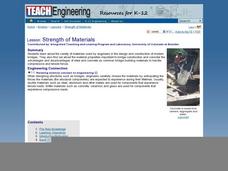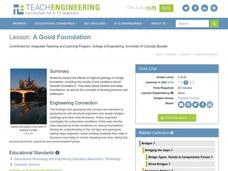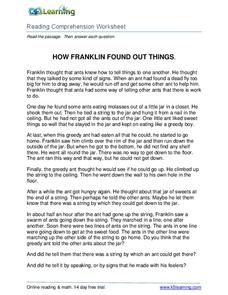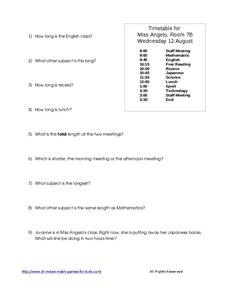Teach Engineering
Strength of Materials
Pupils examine a stress-strain diagram that compares the advantages and disadvantages of the two common bridge building materials, concrete and steel. The also consider the factors that influence the materials builders choose for their...
Teach Engineering
Edible Rovers (High School)
Design and build a rover ... then eat it? This activity has groups of two design and build Mars rovers. The teams determine what instruments they want to include with their rover and plan a budget. They calculate the cost of the body of...
Teach Engineering
A Good Foundation
It takes a strong foundation to build a house and a stronger one for a bridge. This resource presents the effects of geology and soil on bridge foundations. Working in groups, the class investigates the interaction of shallow and deep...
K5 Learning
Changes
You can't unring a bell, but can you unmelt an ice cube? Readers consider reversible and irreversible changes with a short informational reading passage and accompanying comprehension questions.
Geophysical Institute
Latitude and Longitude with Google Earth
Travel the world from the comfort of your classroom with a lesson that features Google Earth. High schoolers follow a series of steps to locate places all over the earth with sets of coordinates. Additionally, they measure the distance...
K5 Learning
The Astronomy Project
A passage about an astronomy lesson may leave readers starstruck. Fifth graders read about a class's exploration into the makeup of the galaxy and its constellations before answering six questions about the terms and vocabulary...
K5 Learning
Space Based Astronomy
How much astronomy can you study with the naked eye? Learn more about the ways scientists explore the galaxy with a short reading passage and set of short-answer questions.
K5 Learning
Rocks
Five short answer questions follow an informational reading passage that details the three different types of rocks—sedimentary, igneous, metamorphic—and their rock cycle.
K5 Learning
Why Does the Ocean have Waves?
Six short answer questions challenge scholars to show what they know after reading an informational text that examines waves—what they are, what causes them, and how different Earth factors affect their size and strength.
K5 Learning
Will the Wolf
How well can a wolf survive without a pack? Third graders read about headstrong Will and his desire to be an independent wolf with a short story and series of comprehension questions.
Teach Engineering
Earthquakes Living Lab: Finding Epicenters and Measuring Magnitudes
Pairs use an online simulation to determine the epicenter and magnitude of an earthquake. Using real data about the earthquake's maximum S wave amplitudes, they then determine the magnitude. The resource provides a great career...
Scholastic
Marijuana: Perception of Harm vs. Use
Many teenagers don't believe that marijuana is harmful, but if they do, it affects whether they use it or not. Analyze the relationship between what high school seniors believe about marijuana and their tendency to use it with a reading...
K5 Learning
How Franklin Found Out Things
Franklin learns about the world by making observations, and so do we! A short reading assignment prompts fourth graders to answer comprehension questions about a curious boy and what he notices.
Curated OER
Favorite Subjects
In this favorite subjects learning exercise, students complete 2 tables by following the clues for missing pieces of information for 2 different classes. Students fill in 6 missing places to the chart.
Curated OER
Kids Astronomy
In this astronomy word scramble worksheet, students examine the 16 letter groupings and use the decoder to help them reveal the 16 astronomy terms listed at the bottom of the worksheet,
Curated OER
Statistics
In this statistics activity, students view 6 graphs to determine the correlation. Students then answer 4 questions that involve plotting data, determining a relationship, and making predictions.
Curated OER
Problem-Solving Decision: Too Much or Too Little Information: Practice
For this too much or too little information worksheet, students determine if they have too much or too little information to solve the word problem. Students solve four problems.
Curated OER
Supplementary Related Rates Problems
In this rates worksheet, students read story problems, determine the necessary information, and set up equations to determine the velocity and rates. This two-page worksheet contains two multi-step story problems.
Curated OER
Graphing Activity
In this graphing worksheet, students use data from a tally chart to complete a graph of favorite subjects and answer 4 related questions. A website reference for additional resources is given.
Curated OER
Timetable: subjects for the day
In this time table worksheet, students view the subjects and schedules for different classes for the day and answer time related questions about them. Students look at 4 schedules and answer 31 questions total.
Curated OER
Using a Chart to Track Book Sales
On this using a chart to track book sales worksheet, students use the chart for 6 types of books sold over a 6 day period to answer 8 fill in questions about interpreting the chart.
Curated OER
Make a Tally
In this tally chart worksheet, students read the word problems and use the information within the problem to make a tally chart. Students use the tally charts to help them finish and solve the word problem.
Curated OER
Add Mixed Numbers with and without Regrouping
In this adding mixed numbers with and without regrouping worksheet, students sharpen their problem solving skills as they solve 6 story problems.
Curated OER
Leveled Problem Solving Comparing And Ordering Fractions
In this fraction worksheet, 6th graders compare and order fractions in order to solve 6 word problems. They work with problems that have like and unlike denominators.
Other popular searches
- Math and Science
- Math and Science Careers
- Integrated Math and Science
- Science/ Math Games
- Math and Science Activities
- Integrating Math and Science
- +Math and Science Careers
- Math and Science Plan
- Math in Science
- Math Science
- Math and Science Lessons
- Math and Forensic Science























